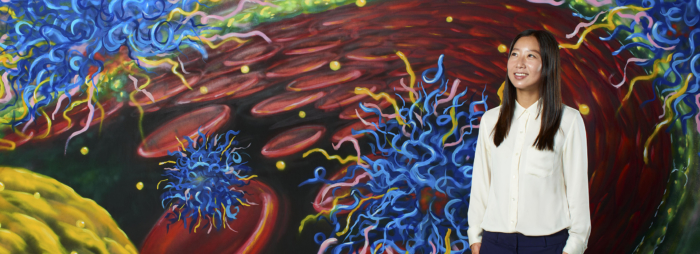This past October, Eunji Chung ’06 was the recipient of the National Institutes of Health (NIH) New Innovator Award. The $2.4 million grant “provides funding to extraordinarily creative scientists proposing highly innovative research to address major challenges in biomedical science.” The New Innovator Award is the highest NIH honor for researchers early in their careers.

Chung, who received a BA with honors in molecular biology from Scripps and a PhD in bioengineering from Northwestern University, is currently a Gabilan Assistant Professor of Biomedical Engineering at the University of Southern California, with courtesy appointments in the Departments of Medicine, Surgery, and Chemical Engineering and Materials Science.
“When I think back on my education from Scripps, I appreciate the science foundation I received from professors such as Professors Emily Wiley [molecular biology and Chung’s thesis advisor] and Nancy Williams [organic chemistry], as well as the quality of their care for my individual learning and the passion they had for their courses and research,” recalls Chung. “I also got my first exposure to lab outings and how to promote lab morale, which are all important aspects to management of a research project.”
Now a lead researcher—called a principal investigator—in her own right, Chung aims to develop novel treatment approaches to autosomal dominant polycystic kidney disease (ADPKD), the most commonly inherited kidney disorder worldwide. ADPKD causes large, fluid-filled cysts to grow in the kidneys, which diminishes kidney function over time. Currently, there are no cures or treatments to slow or stop disease progression and, by age 60, half of all patients require dialysis or a kidney transplant. In her research project, Chung aims to develop multifunctional nanotherapeutics that can be taken orally to directly access diseased kidneys and deliver drugs to simultaneously stop the formation and expansion of renal cysts.
To do this, Chung developed a nanoparticle—particles in the range of 1 to 10 nanometers—called “micelles” that can ferry medicine directly to the kidney.
“Foreign objects, whether they be nanoparticles or drugs like Tylenol, have to go through a set of barriers before they can take effect in the body. For example, a drug like Tylenol must get past the harsh environment of the stomach after being taken orally, go into the intestines, and ultimately cross cellular barriers to enter into the bloodstream, which will then shuttle it to the right target. However, as you can imagine, small drugs also enter into healthy tissues and cells, and hence, we are subjected to adverse side effects. This phenomenon is most obvious in a case like chemotherapeutic drugs,” she explains. “The ‘micelle’ nanoparticle that we designed, supported by the NIH New Innovator Award, aims to use materials that can, first, protect drugs from harsh environments when taken orally, and second, direct drugs specifically to diseased kidneys while limiting off-target side effects.”
Chung’s use of nanoparticles for polycystic kidney disease is the first of its kind. Her long-term goal is to develop a library of nanotherapeutics and get more nanotherapies tested in clinical trials to improve patient care.
“I knew I wanted to pursue research that can be translated into patient care during graduate school, so I pursued biomedical engineering and chose a lab that designed biodegradable materials for orthopedic implants in graduate school. During my postdoctoral research, I pursued nanotechnology for cardiovascular diagnostics. With such training, today, my lab is inching closer to translating our technologies to the clinic through collaboration with a variety of clinicians,” says Chung. “The overarching goal is to improve the quality of life for the millions of ADPKD patients worldwide.”


